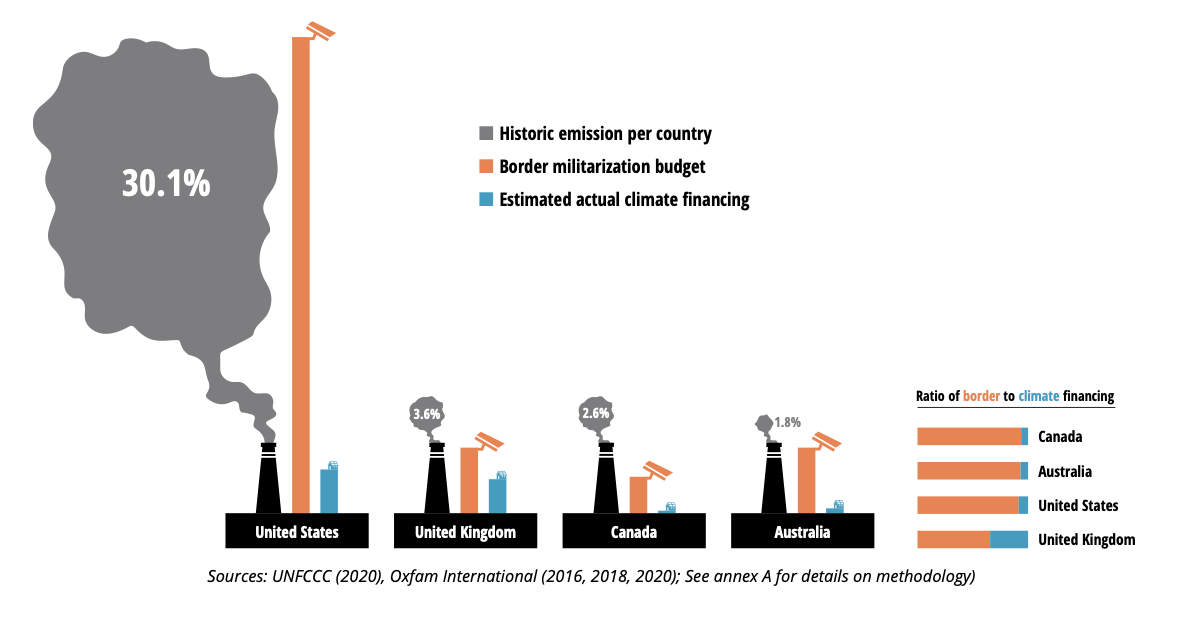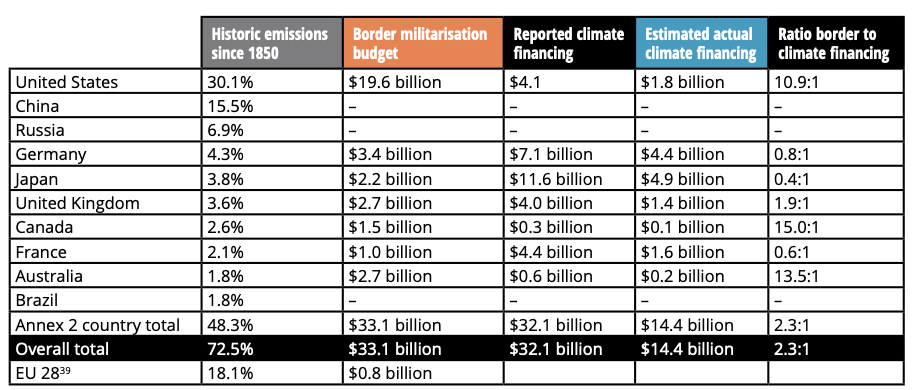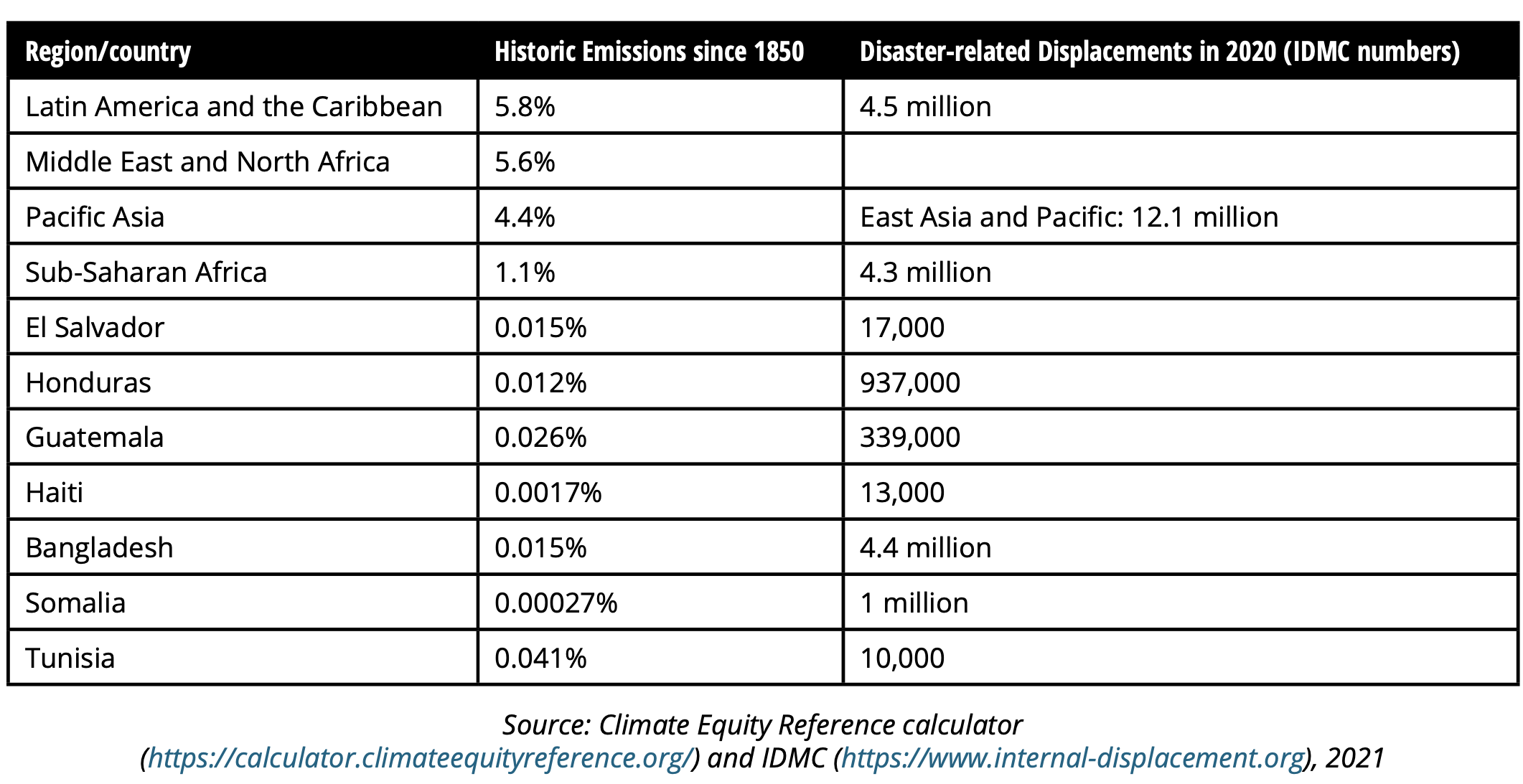Up to three billion people may be exposed to near unlivable temperatures by 2070 according to recent research. At this point, hundreds of millions of people may have already fled their country due to deadly storms, rising sea levels and drought-induced famines — all exacerbated by climate change. Despite clear projections of intensified disasters and mass displacement, why are some of the richest countries in the world spending more money militarising their borders than they are directing to climate finance?
Climate change is no longer a future concern, it’s a present reality. Last year, three times as many people were displaced by intense storms and flooding than violent conflicts as the number of people internally displaced hit record-high. Twenty people are displaced every minute of the day and this number is only set to increase as the world heats up and ecosystems collapse.
World leaders may be gathered in Glasgow negotiating the future of climate action, but 60% of IPCC authors already have little hope of a world that keeps global warming under 3°C compared to pre-industrial levels. 3˚C would bring collapsing ice sheets, total loss of coral reefs, hundred-year droughts and irreversible sea-level rise.
This doesn’t have to be our future though.
“The good news is that these impacts can be greatly reduced if humanity succeeds in curbing global warming,” said Tim Lenton, co-author of the study, climate specialist and director of the Global Systems Institute at Exeter university.
Depending on the global collective actions taken today, internal climate migration could be reduced by up to 80% — to 44 million people — by 2050. This global action would have to entail a divestment from the fossil fuel industry and increased climate financing for the world’s most vulnerable countries — a situation that seems unlikely given current spending decisions.
The world’s biggest emitters of greenhouse gases (GHGs) — the United States, Germany, Japan, the United Kingdom, Canada, France and Australia — collectively spent twice as much on border and immigration enforcement than on climate finance between 2013 and 2018. Canada, the worst offender, spent 15 times more.

These seven countries are responsible for almost half of the world’s historic greenhouse gases. They have industrialised and profited from rampant pollution and now that the consequences of their emissions are being dealt out across the world, they not only close their borders to refugees but withhold their greenhouse-gas-stained money.
Despite having contributed little to the climate crisis, its impacts are most heavily played-out in vulnerable, low income countries. Climate finance was supposed to acknowledge this unfair burden and aid these countries in adapting to and mitigating climate degradation. However, the current climate finance system has been rife with failures and inequalities whilst also falling far short in terms of scale.

“Developed” countries promised $100 billion every year in climate finance. In 2020, climate related disasters caused economic losses of $171 billion. By 2030, $300 billion will be needed every year for climate adaptation alone according to the United Nations.
It’s clear that climate finance alone is underfunded, but the fact that funds are diverted away from the millions of people currently fighting climate change and towards militarised borders to keep those people out is unconscionable. Neglected climate finance risks exacerbating climate change as low income countries adopt less-environmentally friendly modes of development and cannot protect vital ecosystems.
Related Articles: Africa Calls for Climate Finance Reform as Pledges Go Unmet | Europe’s Refugee Crisis Is a Crisis of Humanity, not Migration.
Investing in climate adaptation and mitigation has the power to save millions of lives, reduce conflict, stave off deadly levels of warming and reduce forced displacement and climate migration, in turn reducing the need for border security. Unfortunately, these countries seem intent on militarising their borders, despite alarming death tolls and human rights violations.
Although a significant underestimate, the International Organization for Migration (IOM) reports that roughly 45,000 migrants died between 2014 and 2020 as routes have become increasingly dangerous. The budget for the European Union’s border agency, Frontex, has flourished, increasing by a whopping 2763% since its inception, despite accusations of human rights violations. Illegal pushbacks, inhumane refugee camps and the denial of asylum claims appear to be a growing trend around the world as more and more people are forced to flee from their homes.

As world leaders gather in Glasgow for COP26 to discuss the future of climate action, the disparity between border and climate finance exposes their true concerns. Instead of tackling the root causes of migration and working to stabilise the environment, high-emitting states are funneling more money into systems that will penalise those who attempt to escape a crisis they aren’t responsible for. Despite only emitting 0.00027% of historic emissions, one million people (6% of the population) across Somalia were displaced by climate-related disasters in 2020.
There are clear paths towards stabilising the climate and averting its most catastrophic consequences, arming borders just isn’t one. If there is any hope of climate justice, these budgets need to be adjusted.
Editor’s Note: The opinions expressed here by Impakter.com columnists are their own, not those of Impakter.com. — In the Featured Photo: A combat engineer erects barbed wire at the California-Mexico Border. Featured Photo credit: United States Navy










